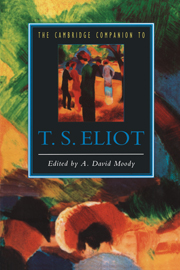Book contents
- Frontmatter
- 1 Where is the real T. S. Eliot? or, The Life of the Poet
- 2 Eliot as a product of America
- 3 Eliot as philosopher
- 4 T. S. Eliot's critical program
- 5 The social critic and his discontents
- 6 Religion, literature, and society in the work of T. S. Eliot
- 7 “England and nowhere”
- 8 Early poems
- 9 Improper desire
- 10 Ash-Wednesday
- 11 Four Quartets
- 12 Pereira and after
- 13 “Mature poets steal”
- 14 Eliot's impact on twentieth-century Anglo-American poetry
- 15 Tradition and T. S. Eliot
- 16 Eliot
- 17 Eliot studies
- A Select Booklist
- Index
4 - T. S. Eliot's critical program
Published online by Cambridge University Press: 28 May 2006
- Frontmatter
- 1 Where is the real T. S. Eliot? or, The Life of the Poet
- 2 Eliot as a product of America
- 3 Eliot as philosopher
- 4 T. S. Eliot's critical program
- 5 The social critic and his discontents
- 6 Religion, literature, and society in the work of T. S. Eliot
- 7 “England and nowhere”
- 8 Early poems
- 9 Improper desire
- 10 Ash-Wednesday
- 11 Four Quartets
- 12 Pereira and after
- 13 “Mature poets steal”
- 14 Eliot's impact on twentieth-century Anglo-American poetry
- 15 Tradition and T. S. Eliot
- 16 Eliot
- 17 Eliot studies
- A Select Booklist
- Index
Summary
In 1917 T. S. Eliot compared the literary critic to a bee building a hive. Even the most gifted thinker, he claimed, is unable to conceive more than a few original ideas:
With these, or with one, say, hexagonal or octagonal idea, each sets to work and industriously and obliviously begins building cells; not rebelling against the square or the circle, but occasionally coming into collision with some other Bee which has rectangular or circular ideas.
This conception of the cooperative nature of the literary enterprise is grounded in what Eliot called “the old aporia of Authority v. Individual Judgment” (PP [New York], p. 113). Although he found the criterion for genuine art within the literary tradition, his innovative conception of that tradition also gave authority to the individual artist. He developed his traditionalism with such hive-building thoroughness that it seemed revolutionary rather than conventional. In describing such “new ideas,” Eliot observed that an old idea may be “so perfectly assimilated as to be original.” His deep assimilation of the “old aporia” of tradition and the individual made it a virtually new concept.
- Type
- Chapter
- Information
- The Cambridge Companion to T. S. Eliot , pp. 48 - 59Publisher: Cambridge University PressPrint publication year: 1994
- 4
- Cited by



